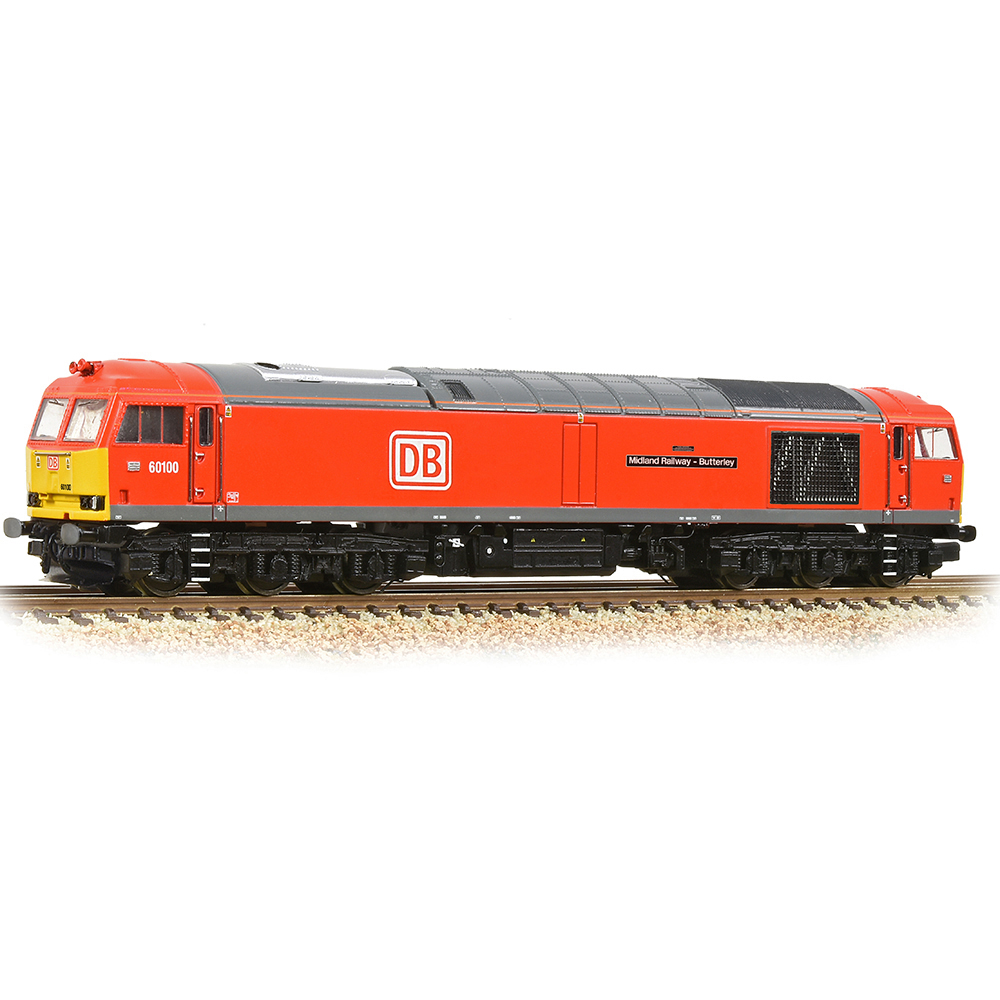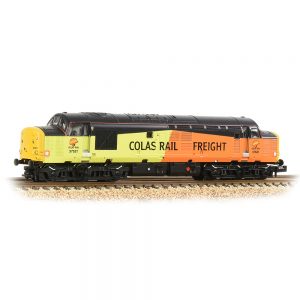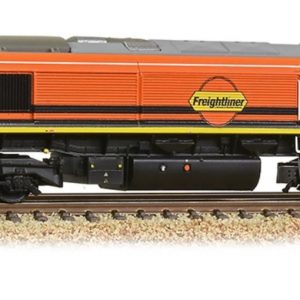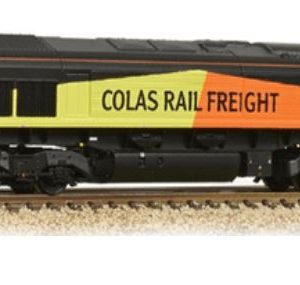Description
MODEL FEATURES:
- Graham Farish N Scale
- Era 9
- Pristine DB Cargo livery
- Running No. 60100
- Named ‘Midland Railway – Butterley’
- Accessory pack
- NEM Coupling Pockets
- Powerful Coreless Motor
- Directional lighting, switchable on/off at either end on DCC or Analogue control
- Cab lighting*, assigned to two DCC functions for separate switching of each (*when used on DCC)
- SOUND FITTED – Fitted with a Zimo MS590N18 Sound Decoder – See below for the function list
- Length 144mm
SOUNDS
F0 – Directional Lights
F1 – On – Warm Engine Start / On, Off – Failed Engine Start / On, Off, On – Cold Engine Start
F2 – Brake
F3 – Single Horn (Speed Related)
F4 – Two Tone Horn
F5 – Light Engine / Heavy Train Mode
F6 – Engine Idle / Coasting
F7 – Speed Lock
F8 – Engine Speed-up
F9 – Flange Squeal (Speed Related)
F10 – Guard’s Whistle (When Stationary) / Speed Related Detonators (When Moving)
F11 – Parking Brake (Functional)
F12 – Coupling
F13 – Compressor
F14 – Spirax Valves Venting
F15 – Cooler Group Fan
F16 – Driver’s Telephone Test
F17 – Fire Bell
F18 – On – Cab Door Open / Off – Cab Door Closed
F19 – Fade All Sounds
F20 – Directional Lighting Off (No. 1 End)
F21 – Directional Lighting Off (No. 2 End)
F22 – Cab Light (No. 1 End)
F23 – Cab Light (No. 2 End)
F24 – Station Ambience
F25 – On – ‘Morning’ / Off – Driver’s Response
F26 – Shunting Mode
F27 – Volume Down
F28 – Volume Up
Analogue Users: Directional lights and basic Prime Mover (engine) sounds, which vary with speed, plus any other automated sounds, can be enjoyed when using this model on analogue control (DC) straight from the box!
CLASS 60 HISTORY
The British Rail Class 60 is a Class of Diesel-Electric Locomotive built by Brush Traction in Loughborough, Leicestershire between 1989 and 1993. Affectionately known as ‘Tugs’ by enthusiasts due to their Mirrlees marine-derived powerplant, 100 locomotives were built and the first entered service in late-1990 – more than a year after the first example had been ceremoniously handed over to BR – after various technical issues were uncovered during testing of the first locos. Designed for heavy freight trains, the Class 60s entered service at a time when BR’s Railfreight operations had been split into various sub-sectors and locomotives were assigned to the Coal, Metals, Construction and Petroleum divisions of BR Railfreight, with each carrying the triple-grey base livery with the addition of the relevant graphics for the sub-sector and depot plaques.
In 1994 and in the runup to the Privatisation of British Rail, the Class 60 fleet was split between three of the shadow freight operators – Loadhaul, Mainline and Transrail – that had been created to handle BR’s freight business. All three operators were purchased by EWS in 1996, resulting in the entire class falling under EWS ownership. With the introduction of the Class 66s at the end of the century and coupled with a decline in EWS heavy freight traffic, several Class 60s were put into store and the future of the fleet was uncertain at times. However, a number of locomotives were retained as the heaviest trains could not be hauled by a single Class 66 and instead required the superior power of a Class 60. EWS was acquired by DB Schenker in 2007 (later renamed DB Cargo) and the new owners put several Class 60s up for sale, however they also announced overhauls for some 60s, giving the class glimmers of hopes for the future.
In 2014 Colas Rail purchased ten Class 60s and these remained with the company until 2018 when they were replaced by Class 70s. These ten Class 60s were subsequently sold to GB Railfreight who still operate the fleet which includes No. 60002 that was named ‘Graham Farish – 50th Anniversary 1970 – 2020’ to mark 50th anniversary of production of British N scale models by the brand which is now owned by Bachmann Europe.
Despite their ups and downs, the Class 60s continue to serve DB Cargo, GB Railfreight and other private operators including DC Rail and the class remains a popular sight across the UK where they can be found hauling the heavy freight trains for which they were originally designed.





